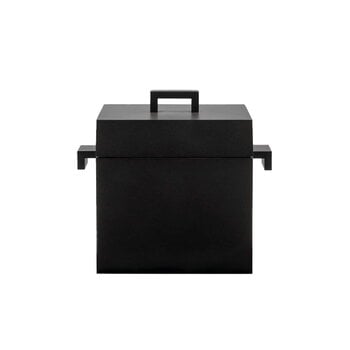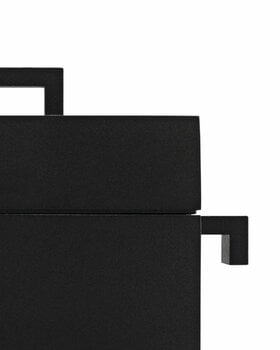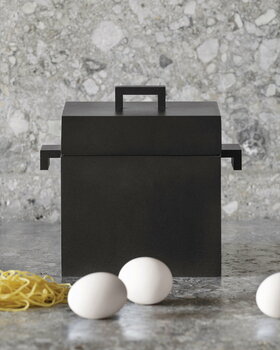Alessi’s La Cubica cocotte is an unconventional design by Italian architect Aldo Rossi. Creating an intriguing contrast with traditional, rounded shapes of pots and pans, the cubic cocotte is a stunning addition to any kitchen. Perfect for all kinds of cooking, La Cubica can be used both in the oven and on the stove.
La Cubica cocotte
Alessi
Description
Alessi’s La Cubica cocotte is an unconventional design by Italian architect Aldo Rossi. Creating an intriguing contrast with traditional, rounded shapes of pots and pans, the cubic cocotte is a stunning addition to any kitchen. Perfect for all kinds of cooking, La Cubica can be used both in the oven and on the stove.
Product details (8)
- Material
- Aluminum, steel
- Colour
- Black
- Length
- 8.46 in (21.5 cm)
- Width
- 6.69 in (17 cm)
- Height
- 7.68 in (19.5 cm)
- Capacity
- 2.54 qt (2.4 l)
- Notes
- Casting with non-stick interior. Magnetic steel bottom suitable for induction cooking.
- Care instructions
- We recommend hand wash.
Designer
Aldo Rossi (1931–1997) is one of the most acclaimed Italian architects of the second half of the 20th century. One of his best-known works is the cemetery in Modena, Italy, which Rossi designed in 1971. The cemetery's buildings – like many of Rossi’s other works – exhibit the strong colors, clear geometry, and ironical historical references typical of postmodernism, but Rossi himself claimed he was not part of the movement. “I cannot be postmodern, as I have never been modern,” he is said to have said.
Born in Milan, Rossi graduated as an architect from the Politecnico di Milano in 1959. During his long career he became known not only as an architect, but also as an artist and theorist who toured the world teaching in Milan, Venice, and many U.S. top universities. Rossi was also the first Italian architect to be awarded the prestigious Pritzker Prize.
View all productsReviews (0)
Sustainability
The Product Sustainability Framework, our criteria of sustainable design, helps you find the most sustainable products in our selection. Read below which sustainability criteria this product has met.
Working conditions & labour 8/9
-
Equal opportunities for all employees
-
Commitment to UN Global Compact, fair compensation for all employees
-
Corporate responsibility requirements defined and communicated for suppliers
-
Systematic work for improved inclusion and well-being in the workplace
-
Transparent supply chain
-
Suppliers' compliance to a code of conduct ensured
-
Direct suppliers audited and certified
-
Compliance to the UN Guiding Principles on Business and Human Rights ensured in the supply chain
-
Support for community involvement in the supply chain
Eco-friendly production 8/9
-
Fair and resource-wise water-use in production
-
No incineration or landfilling of returned items
-
No use of endangered species as materials
-
No direct environmental emissions or waste (excl. GHGs) from production
-
The sustainability of direct suppliers' production is addressed and monitored
-
Production and material sourcing that respect biodiversity, animal rights, and natural ecosystems
-
Material-efficient and ecological packaging
-
No potentially harmful chemicals used in own production
-
Positive impact on nature’s well-being through operations that regenerate natural ecosystems
Climate impact 4/8
-
Company's direct greenhouse gas emissions identified and commitment to reduction
-
Product's carbon impact identified and commitment to reduction
-
Guidance on energy- and eco-efficient use of the product
-
Carbon footprint of the product calculated and goals set to reduce it
-
Contribution to climate initiatives beyond the brand’s direct operations
-
Low-carbon or compensated transportation
-
100 % renewable energy in own production and operations
-
Carbon neutral or carbon negative product
Sustainable materials 5/6
-
Sustainable and long-lasting material choices
-
No harmful or hazardous substances
-
Responsible raw material sourcing and production
-
Materials suited for circularity: monomaterials, recyclable finishings, renewable or recycled contents etc.
-
Ecological materials: natural, biodegradable, recyclable or recycled contents
-
Outstanding materials in terms of innovativeness, responsibility, sustainability and circularity: local production or sourcing, 100 % recycled content, C2C-certification etc.
Circular design 5/5
-
High aesthetic quality promoting long-term use of the product
-
Technically durable product design and material choices
-
Design for enduring life-long quality
-
Design and support for product maintenance, repair and upgradability
-
Innovative circular design solutions: circular service system, resale platform, remanufacturing, collection of used products, etc.
Chat to us online
Please enable functional cookies to use this feature. You can change your cookie settings at any time.







